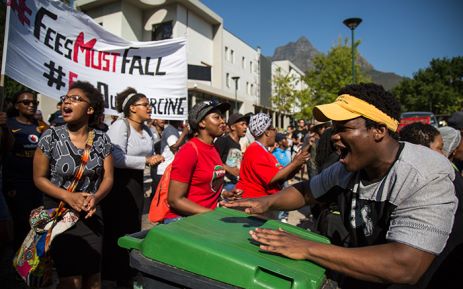África/Sudáfrica/14 de Agosto de 2016/Autor: Dineo Bendile/Fuente: EWN
RESUMEN: El Consejo de Educación Superior ha recomendado un aumento en todos los ámbitos relacionadossegún la inflación para las universidades de Sudáfrica en 2017. A principios de este año, el ministro de Educación Superior Blade Nzimande pidió al consejo para que le asesore sobre un marco regulador para la gestión de los aumentos de tasas tras numerosas protestas de los estudiantes. Ahora el cuerpo ha presentado un informe al Nzimande, donde se dice que un aumento de tasas cero por ciento el próximo año será insostenible. El Consejo de Educación Superior ha aconsejado a las universidades para acordar un aumento de tasa uniforme que será implementado en el año 2017. Se cree que un aumento de la manta en el nivel del índice de precios al consumidor es el método más favorable para su uso. Según el informe, este método equilibra los intereses de los estudiantes con la sostenibilidad del sector de la educación superior. Sin embargo, muchas asociaciones de estudiantes que han hecho presentaciones ante la comisión de investigación sobre la educación superior gratuita esta semana todavía mantienen el rechazo hacia el aumento de tasas el próximo año.
The Council on Higher Education has recommended an across the board inflation-related increase for South Africa’s universities in 2017.
Earlier this year, Higher Education Minister Blade Nzimande asked the council to advise him on a regulatory framework for managing fee increases following numerous student protests.
Now the body has submitted a report to Nzimande, where it says a zero percent fee increase next year will be unsustainable.
The Council on Higher Education has advised universities to agree on a uniform fee increase which will be implemented in 2017.
It believes a blanket increase at the level of the consumer price index is the most favourable method to use.
According to the report, this method balances the interests of students with the sustainability of the higher education sector.
The council says universities are better off negotiating as one unit than having individual exchanges with students over increases.
However, many student bodies that have made presentations to the commission of inquiry into free higher education this week still maintain they want no fee increase next year.
‘THERE’S NO MONEY’
Yesterday, National Treasury said it hadn’t budgeted for another zero percent fee increase in the higher education sector next year.
Treasury said it hadn’t made any plans for the decision to be rolled over to 2017 but it had planned for fee increases to resume next year and will now continue with involvement in fee discussions.
Treasury Deputy Director General Michael Sachs said, “We’ve budgeted on the basis that we will return to the situation of normal fee increases.
“But of course we’re prepared to respond to changes if they’re there.”
Sachs said continuing with no fee increases will mean sourcing money from other aspects of the Budget.
With Treasury saying it’s not willing to take out loans to spend more on higher education, it said the only other alternative is to increase taxes.
Lobby group Students for Law and Social Justice (SLSJ) said it believed students should only pay university fees based on what they can afford.
The group made its presentation to the commission of inquiry into free higher education yesterday afternoon.
Like other student groups, it was also calling fees to remain flat despite National Treasury saying it hadn’t budgeted for this next year.
Representatives from SLSJ said they didn’t agree with calls for higher education to be free for everyone.
Nikhiel Deeplal said the rich, who can afford to pay, must do so to ease the burden of government having to subsidies universities.
“The rich must be able to subsidise the poor, therefore remove the billions that are being pumped into State institutions and we give it to individual students.”
The group believed its proposed method will work better than the current system which sees National Student Financial Aid Scheme funding given to poor students, while those who don’t qualify are disadvantaged.







 Users Today : 30
Users Today : 30 Total Users : 35460047
Total Users : 35460047 Views Today : 43
Views Today : 43 Total views : 3418674
Total views : 3418674